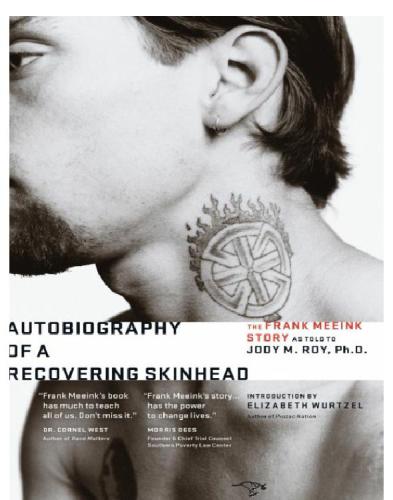
Autobiography of a Recovering Skinhead
The Frank Meeink Story as Told to Jody M. Roy, Ph.D.
کتاب های مرتبط
- اطلاعات
- نقد و بررسی
- دیدگاه کاربران
نقد و بررسی

Starred review from March 15, 2010
In this profound memoir, reformed skinhead Meeink, with assistance from academic and activist Roy (Love to Hate: America's Obsession with Hatred and Violence), recounts his former life as a Neo-Nazi. Told with passion and clarity, Meeink's story begins with neglectful parents and an abusive, junkie stepfather, who sowed the anger and hatred that would make him a prime candidate for the Neo-Nazi movement that exploded in Philadelphia through the late 1980s and '90s. Before long, Meeink's mutual embrace with the National Alliance led him to his own gang of recruits and a (largely random) "holy war" that would end up haunting him: "How many of my victims had wished for death while I brutalized them?" In federal prison at age 17, surrounded by cons of all races and creeds, Meeink first began to question what he'd been taught about the "elite" Aryan race; the 1995 Oklahoma City bombing would complete his transformation, leading him to seek out the feds for confession. A brutal tour of modern American racism at its worst, a case study of traumatized youth and drug addiction, and a stark reminder of the human capacity for redemption, Meeink and Roy's account is a shocking but ultimately reaffirming read.

February 15, 2010
Intensely raw memoir of a reformed Neo-Nazi.
Meeink spent most of his childhood being knocked around in South Philly by his stepfather and running from gangs between his bus stop and his grade school. By age 20, the author was the leader of Strike Force, a local chapter of the Aryan Nation."I felt the rage boiling inside me until I thought I was going to puke or scream or die…We are footsoldiers in God's army. Right. Left. We are the enforcers of God's law. Right. Left. Our race is our fucking religion," he writes. He had already had his own cable-access show, escaped from a mental institution, been to prison and attempted suicide on more than one occasion. Since skinheads associate drug use—not including alcohol—with minorities, Meeink was vehemently opposed to using drugs. However, as soon as he left the"movement," without the Neo-Nazi ethos and peer pressure to keep him in check, Meeink floundered into a daily drug habit, supplied at first by his addled mother. He is now a recovering skinhead and a recovering alcoholic and drug addict. His debut is a boot-stamping march through desperation, hate, violence and salvation, covering his rise to skinhead stardom and his eventual recovery from his destructive vices. Since 1995, the author has been teaching children and young adults about the consequences of conformity and the regrets of a misspent youth. He runs Harmony through Hockey, a community-outreach program endorsed by the Philadelphia Flyers that teaches children the values of unity and equality. It is through his organization that Meeink's gentler side takes over, demonstrating how much a strong will can be misdirected with hatred and how difficult it can be to redirect it with love. Indelicate and harsh, but never preachy or whiny, this is an intimate, uncompromising memoir. Though it hits some predictable notes—mostly because of Edward Norton's familiar character in American History X—it speaks forcefully from experience.
Fearless, enduring story of human fragility and strength.
(COPYRIGHT (2010) KIRKUS REVIEWS/NIELSEN BUSINESS MEDIA, INC. ALL RIGHTS RESERVED.)

June 1, 2010
Meeink, a south Philadelphia child of an alcoholic father and drug-dealing mother, spent over a dozen years as a minor celebrity among the neo-Nazi-skinhead fraternity. At various times he was actively addicted to alcohol, prescription narcotics, and heroin, but at its core Meeink's graphic narrative documents the relative ease through which he reached sobriety from his addiction to hatred and blinding, ultraviolent rage, most decisively by means of playing football with blacks and Latinos in prison. He writes of using his love of sports to found and run an ice hockey program (sponsored by the Philadelphia Flyers and Anti-Defamation League) that brings together youth across racial lines. Meeink's multiple addictions coexist with his multiple recoveries. Even as he builds a career as an inspirational speaker against White Power violence, he is descending into full-blown junkie status. Those familiar with 12-step programs will recognize themes in Meeink's experience: the secret life, extended abstinences, spectacular relapses. The book ends hopefully, with Meeink finishing his storyundertaken, incidentally, as his "fourth step" moral inventoryroughly one-year sober. VERDICT For those inspired by redemption, this quick-paced, sometimes nasty memoir will uplift.Scott H. Silverman, Earlham Coll. Lib., Richmond, IN
Copyright 2010 Library Journal, LLC Used with permission.

March 15, 2010
Heres a memoir guaranteed to generate a high amount of interest (and probably controversy). Before he was out of his teens, Meeink, a member of a group of white supremacists, was behind prison bars. But by the time he was released on parole, he was a changed man, having cast off his hatred; he became a public speaker, sharing his experiences, helping others to understand the nature of hatred and to find ways to combat it. Stories of personal redemption dont get much more interesting than this one, and the gritty first-person narrative (in the episodic format associated with as told to autobiographies) draws the reader into Meeinks story, giving it an immediacy and a visceral intensity that makes us feel as though weve lived a bit of his life. Readers should be warned that the book is unflinchingly straightforward: some of the language is quite raw, and some of the imagery quite graphic. But theres absolutely no point in telling this story if youre going to whitewash it first.(Reprinted with permission of Booklist, copyright 2010, American Library Association.)

























دیدگاه کاربران